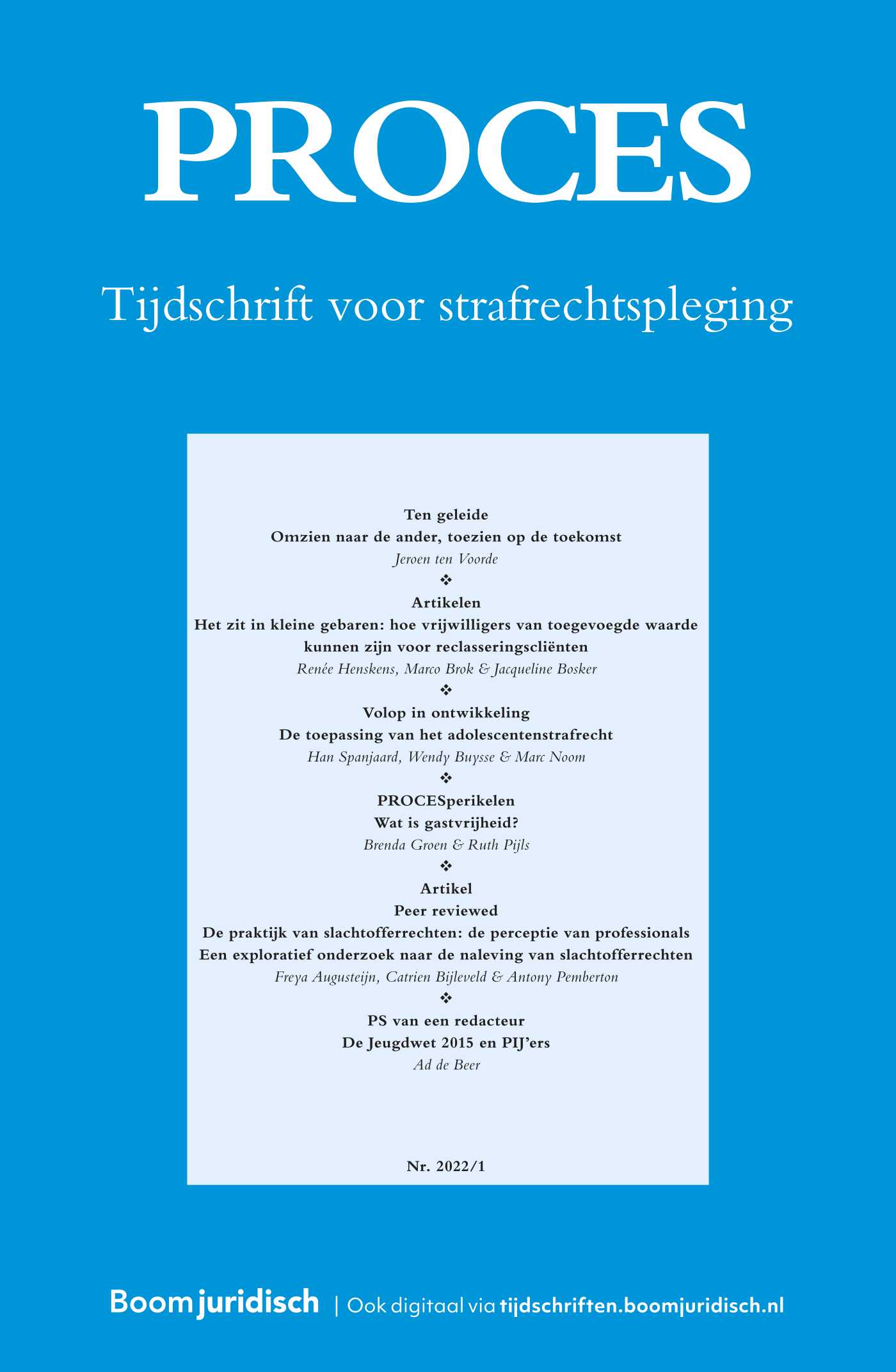|
Part of the new legislation to reform the Dutch conditional release system contains a substantial expansion of the list of individualised conditions under which sentenced prisoners can be released early. These include a prohibition on settlement in a certain area, travelling abroad and on certain voluntary work, an obligation to move and the compensation of damage caused by the offense. These additional individualised conditions have significant implications on the specific character of the conditional release system, the legal protection of offenders, and the ratio between the conditional release system and the already existing conditional measure with regard to serious violent and sex offenders. |


PROCES
Meer op het gebied van Criminologie en veiligheid
Over dit tijdschriftMeld u zich hier aan voor de attendering op dit tijdschrift zodat u direct een mail ontvangt als er een nieuw digitaal nummer is verschenen en u de artikelen online kunt lezen.
| Ten geleide |
PROCES en de wetenschapEen goed en vooral duurzaam huwelijk |
| Auteurs | Joke Harte |
| Auteursinformatie |
| Artikel |
|
| Trefwoorden | voorwaardelijke invrijheidstelling, bijzondere voorwaarden, gedragsbeïnvloedende maatregel, vrijheidsbeperkende maatregel |
| Auteurs | Mirte Bikker |
| SamenvattingAuteursinformatie |
| Artikel |
Het vermeende effect van de coronacrisis op de prevalentie en aard van huiselijk geweldEen overzicht van veronderstellingen en empirische feiten |
| Trefwoorden | huiselijk geweld, coronacrisis, kindermishandeling, Pandemie |
| Auteurs | Vere van Koppen, Carmen ter Weijden en Joke Harte |
| SamenvattingAuteursinformatie |
|
Scientific studies have shown the effect of social crises on the nature and magnitude of domestic violence. Since the beginning of 2020 we are facing a worldwide corona pandemic. There is a widespread fear that the measures as a consequence of this pandemic have led to a significant increase in domestic violence. In this study news reports on the assumptions about the effect of the pandemic on domestic violence were inventoried. Subsequently, an overview was made of current empirical research projects on the assumed effect on domestic violence. The methodological aspects and the preliminary results of these studies are discussed. |
| PROCESperikelen |
Waarom kunnen ze niet gewoon slachtoffer zijn?Van ideal victim tot ideal offender |
| Auteurs | Ruben Boers |
| Auteursinformatie |
| Artikel |
De gevangene als actorDe mogelijkheden van gevangenen om hun eigen situatie en het gevangenissysteem te beïnvloeden in Rotterdamse gevangenissen, 1800-1850 |
| Trefwoorden | Agency, gevangenen, geschiedenis van het gevangeniswezen, macht |
| Auteurs | Iris van der Zande |
| SamenvattingAuteursinformatie |
|
Prisoner’s agency is often marginalized in the Dutch history of the prison. This article concretizes how inmates could influence their own lives and the prison system in the first half of the nineteenth century. By focusing on interaction as an indicator of agency, it is possible to go beyond the traditional analysis of agency as a form of resistance. A multidimensional perspective, in which attention is paid to resistance, negotiation and cooperation enlightens the diversity in which prisoners’ agency is expressed. In this way, this article aims to disprove the persistent stereotype of the powerless prisoner in the historiography of the Dutch prison. |
| Artikel |
Vernietigende arrestenHet ‘sec’ vernietigen van bijzondere voorwaarden in cassatie door de Hoge Raad |
| Trefwoorden | cassatie, Hoge Raad, bijzondere voorwaarde(n), strafrecht |
| Auteurs | Sam van den Akker |
| SamenvattingAuteursinformatie |
|
The Dutch Supreme Court has the power to destroy a penal condition if a lower court imposes those conditions contrary to the law. Problems may arise when the Supreme Court solely destroys the condition. In that case there is no longer an imposed condition, which can be contrary to the meaning of the lower court. It can even derogate the imposed sentence, whilst the convicted is not obligated to conform to those conditions. That problem can – in extreme cases – harm society. Even so can be said that those decisions of the Supreme Court are not in favor of the convicted. |
| Artikel |
Is verslaving behandelbaar?Attitudes van forensisch sociale professionals ten aanzien van middelenmisbruik |
| Auteurs | Lianne Kleijer-Kool, Vivienne de Vogel, Jolein Monnee-van Doornmalen e.a. |
| SamenvattingAuteursinformatie |
|
Forensic social professionals play a crucial role in the resocialization trajectories of their clients with substance use problems. In this explorative study, we conclude that their attitudes to treatability of addiction are positive. However, there are differences in attitudes regarding needed treatment interventions and ways of controlling substance use, for example related to working within specialist addiction services, personal experiences with addiction and working in a clinical setting. When confronted with substance use of their clients, the forensic social professionals’ main reactions are discussing the problem with their client and analyzing the situation. The type of substance and the nature of criminal behavior are important considerations in this reaction. |
| PS van een redacteur |
Nazorg na detentie goed geregeld? |
| Auteurs | Jacqueline Bosker |
| Auteursinformatie |

